1. Organizations understand the importance of recognizing and motivating Gen Z employees, who are tech-savvy, adaptable, and socially conscious.
2. Key strategies include using digital and instant recognition, offering personalized and social recognition, incorporating gamification, and providing learning and development opportunities.
3. Assigning meaningful work projects also enhances their engagement and satisfaction.
4. These tailored strategies can help organizations harness Gen Z’s full potential, driving business growth and success.
As the youngest cohort in the workplace, Gen Z constitutes the most rapidly growing workforce segment across various organizations. This demographic shift highlights the need for businesses to develop and implement targeted strategies that recognize and inspire their Gen Z employees, thereby ensuring their engagement and productivity.

Gen Z, also called Zoomers, comprises people born between the mid-1990s and early 2010s. They constitute more than fifty percent of the workforce in many organizations.
This generation of professionals possesses unique skills and abilities, making them a valuable asset to organizations today.
Ensuring their retention within the organization and developing their full potential can help drive higher business growth.
That is why organizations need to focus on enhancing their workplace experience.

An organization may have at least three to four generations of employees working for it at any given time.
Today’s organizations typically employ employees from multiple generations, including Baby Boomers, Generation X, Generation Y, Millennials, and Generation Z.
Understanding the generational diversity in the organization plays a vital role in driving the performance and efficiency of the workforce.

Gen Z is the first generation born and raised in a world driven by digital technology.
Hence, we can also refer to them as ‘digital natives’ since technology heavily influences their habits and preferences.
The top common traits of people belonging to Gen Z include the following:
1. Extremely Tech-Savvy
2. Ability To Multitask
3. Adaptability And Flexibility
4. Purpose-Driven And Socially Conscious
5. Individualistic Yet Community-Oriented
6. Learning And Career Focused
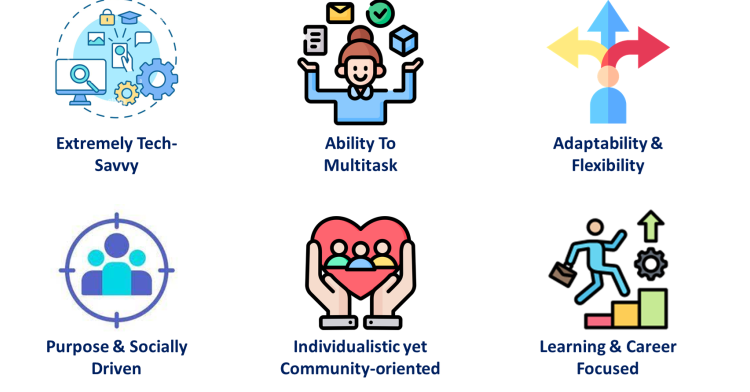

Gen Z is highly comfortable with technology and seeks constant connectivity through social media.
They possess digital skills and can quickly adapt to new digital tools and technologies.
They prefer to get information from online resources and use technology to solve their problems.

People of this generation are highly innovative and willing to take risks.
They are also skilled at handling multiple tasks and responsibilities simultaneously, making them capable of seeking diverse career growth and advancement opportunities.
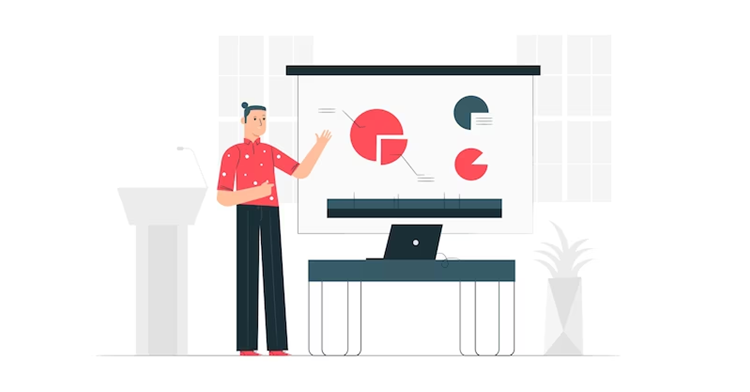
Gen Z people exhibit high adaptability and flexibility as they have grown up in a rapidly changing world.
It enables them to work efficiently in changing environments and challenging situations.
They are willing to accept any change with a positive attitude and view it as an opportunity for growth.
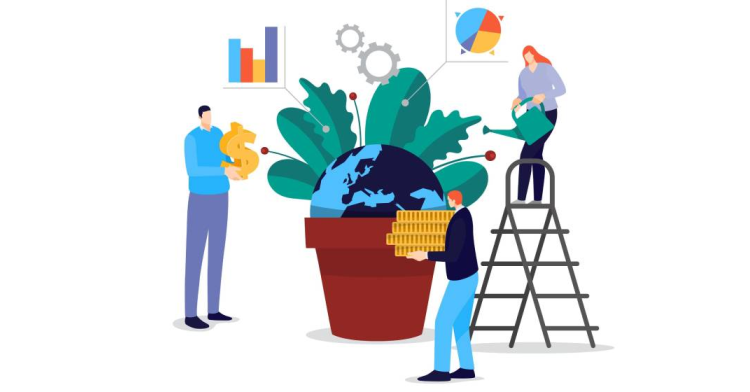
Gen Z people are driven by purpose and awareness about their social responsibilities.
It drives them to seek meaningful job options that will enable them to contribute positively to society.

Gen Z values individuality and personal expression.
However, they also exhibit a strong sense of belonging and community, both online and offline.

They attach great value to education, learning, and development.
Gen Z constantly seeks out new opportunities for learning and self-improvement.
They focus on achieving academic and professional success.

Millennials are the generation that immediately precedes Gen Z. They were generally born between the early 1980s and mid-1990s.
Here are the key differences between Millennials and Gen Z:

Organizations need to understand that each generation of employees is motivated by different things.
Awareness of these motivation drivers ensures that employee rewards and recognition provide the desired business outcomes.
The key motivation drivers for Gen Z include the following:
1. Purpose And Social Impact Of Work
2. Diversity And Inclusivity In the Workplace
3. Continuous Learning And Development
4. Flexible Environment With Great Work-Life Balance
5. Financial Security And Career Growth
6. Need For Personalization
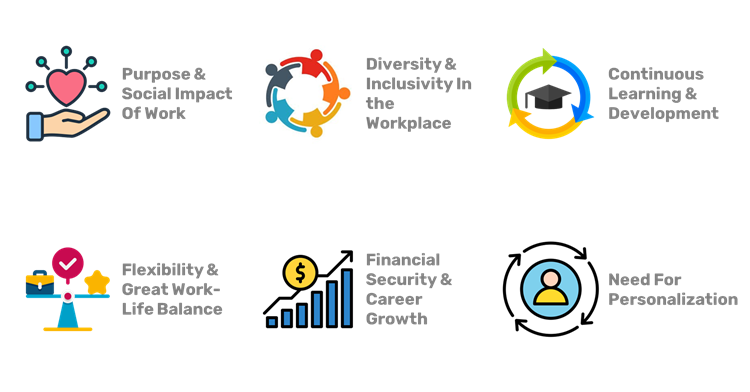

Gen Z is driven by work with a clear purpose and a positive social impact.
They like to clearly understand the purpose of their work and how it will help address various social and environmental issues.
Being socially conscious, they are often involved in various causes and issues, and seek to work with organizations that align with their values.

Gen Zs highly value inclusion and diversity in the workplace.
They celebrate the differences in culture, opinions, and creativity that these bring to the workplace.
They also believe that working in such an environment enables them to appreciate the value of equality and collaboration.

Gen Z members appreciate continuous learning and development opportunities.
These help them evolve as individuals and professionals and stay ahead in a highly competitive world.
That is why they prefer to work for organizations that offer them access to learning opportunities, relevant training, and mentorship.

Gen Z prefers a flexible work environment that enables them to complete tasks with a free mind.
Such a flexible work environment makes it easier for them to maintain a healthy lifestyle and pursue their passions.
It enables them to enjoy an outstanding work-life balance, where they can fulfill their professional responsibilities while taking time for leisure activities and personal relationships.

Gen Z and other generations share the need for financial security and economic growth.
They often face financial challenges, such as student loans, home loans, and other expenses.
That is why they value job options that promise career growth and economic stability.

Due to their strong focus on individuality, Gen Z looks for a high level of personalization in compensation, benefits, rewards, assignments, opportunities, etc., at the workplace.
They value the unique skills and competencies they bring to the organization.
Hence, they are unhappy being treated the same way as others in the organization.

When recognizing employees belonging to Gen Z, organizations need to understand and address their preferences most effectively.
Creating a work environment that these employees find engaging, growth-oriented, and motivating is essential.
Here are the best ways organizations can offer recognition to Gen Z employees:
1. Go Digital With Recognition
2. Ensure Instant/ Timely Recognition
3. Offer Personalized Recognition
4. Enable Social Recognition
5. Incorporate Gamification
6. Consider Learning & Development as Rewards
7. Offer Meaningful Work Assignments as Rewards
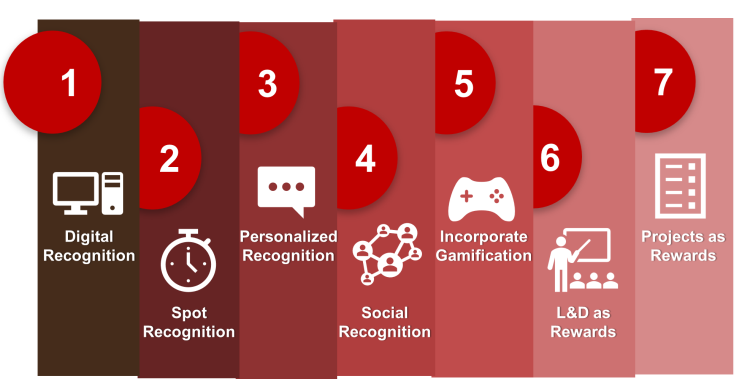

With Gen Z being the most digital-savvy generation in the workplace, it is a no-brainer that they would prefer using digital recognition tools.
Hence, organizations must invest in employee rewards and recognition platforms that digitize the entire process, thereby enhancing the employee experience.
They would also prefer mobile recognition apps that enable them to give and receive recognition on the go.

Gen Z feels happy when their efforts and contributions are recognized spontaneously.
Offering them spot recognition can be very effective as it assures them that their efforts and contributions are noticed by those who matter.
Digital recognition platforms might be the best way to give instant recognition through spot awards and digital ‘thank you’ cards.

Personalized recognition is a great way to motivate Gen Z employees.
It assures them that the organization is aware of their specific contributions and achievements and values them.
By tailoring the recognition to match the needs and expectations of the employees, organizations can send out a positive message that their unique skills and accomplishments are well-appreciated.
Hence, managers and coworkers need to put in additional effort to craft personalized citations for them.
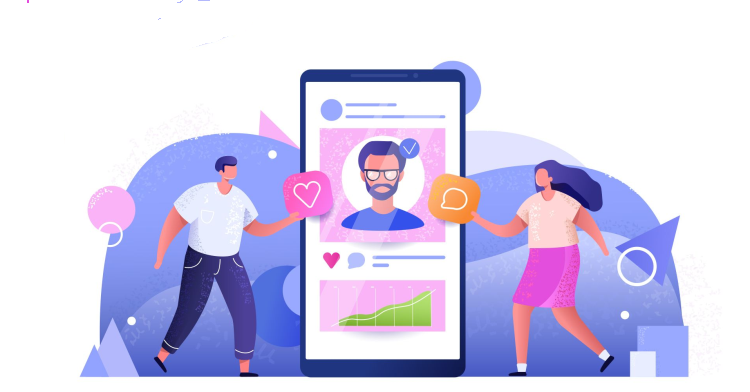
Social recognition, especially in the digital form, gives Gen Z employees the publicity and exposure they want.
Hence, posting updates on their efforts and achievements on internal platforms, such as Teams, Slack, the intranet, and social media platforms like LinkedIn and Facebook, gives them additional motivation.
This social recognition, both within and outside the organization, fills them with a deep sense of pride and accomplishment.

Gen Z is fun-loving and, hence, seeks recognition programs that are interactive and enjoyable;
Hence, organizations should incorporate gamification elements in their programs, such as reward points, badges, leaderboards, goodies, and competitions, to help retain employees’ interest and encourage participation.
It also promotes healthy competition within the workplace by strengthening employee relationships and camaraderie.

Since Gen Z attaches significance to learning and development, providing such opportunities could be an excellent reward option.
The organization could sponsor online or offline courses, workshops, or conferences, or arrange mentorships to reward high-performing employees.
It can enhance employees’ motivation levels, help strengthen their skills, bolster future performance, and pave the way for faster career growth.

Another excellent way to recognize Gen Z employees is to assign them meaningful work assignments, projects, and responsibilities.
It reflects the organization’s trust in its employees’ skills and competence, while providing them with opportunities for professional growth.
Such an assignment assures employees that their organization understands their interests and career objectives and supports them.
In conclusion, harnessing Gen Z’s unique talents and true potential is vital for any organization’s continued success and growth. Organizations must deeply understand their values and aspirations and implement tailored strategies to motivate and recognize Gen Z employees.

Lead author: Sagar Chaudhuri, the Co-Founder and CEO of HiFives. He is an HR Tech Evangelist with over 25 years of experience in both corporate and entrepreneurial settings. Previously, Sagar has held leadership roles with companies such as Genpact, Infosys, and ICICI Bank. He has an engineering degree from IIT Kharagpur and an MBA from IIM Lucknow. Connect on LinkedIn
To stay updated on the latest HiFives blogs, follow us on Twitter (@MyHiFives)